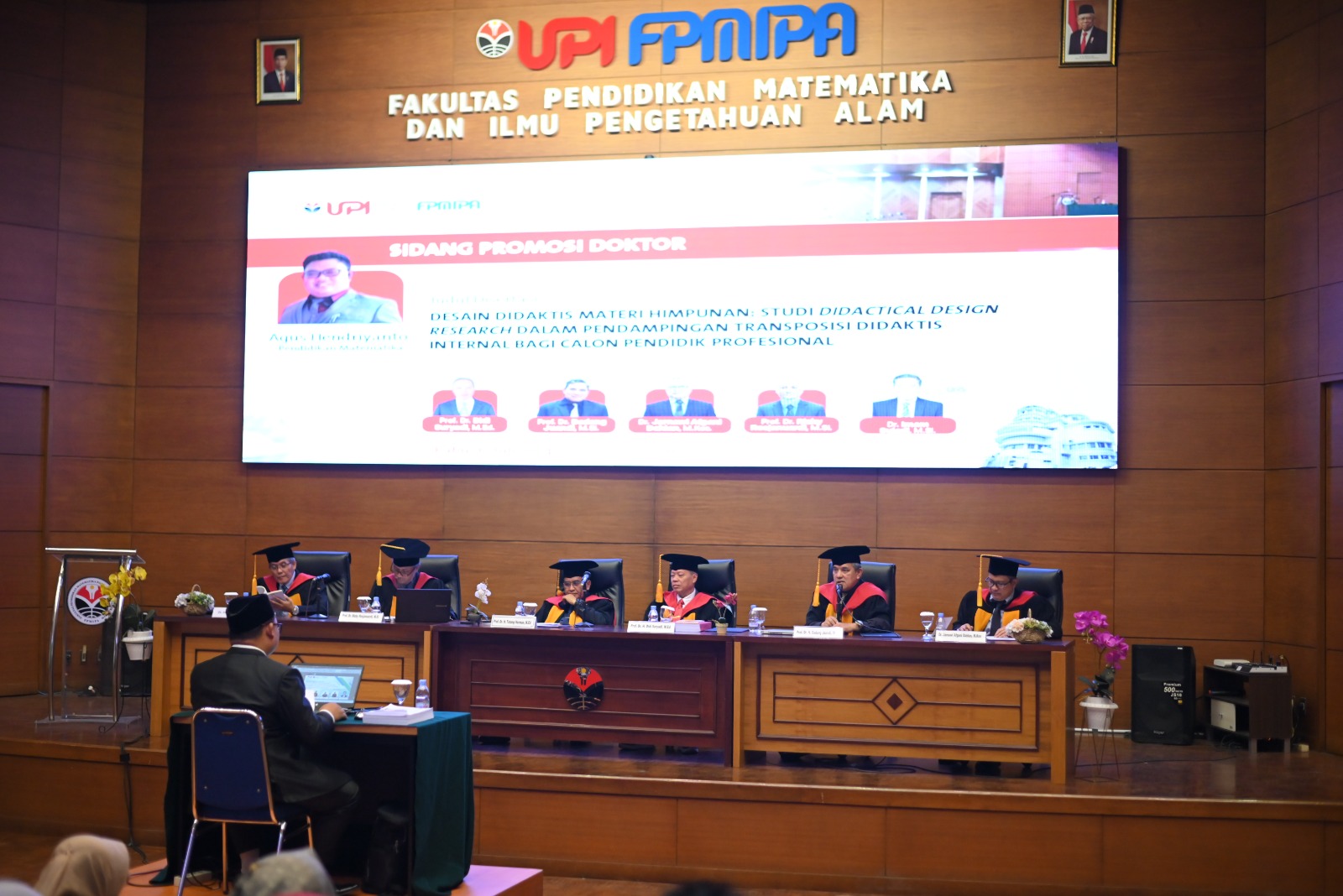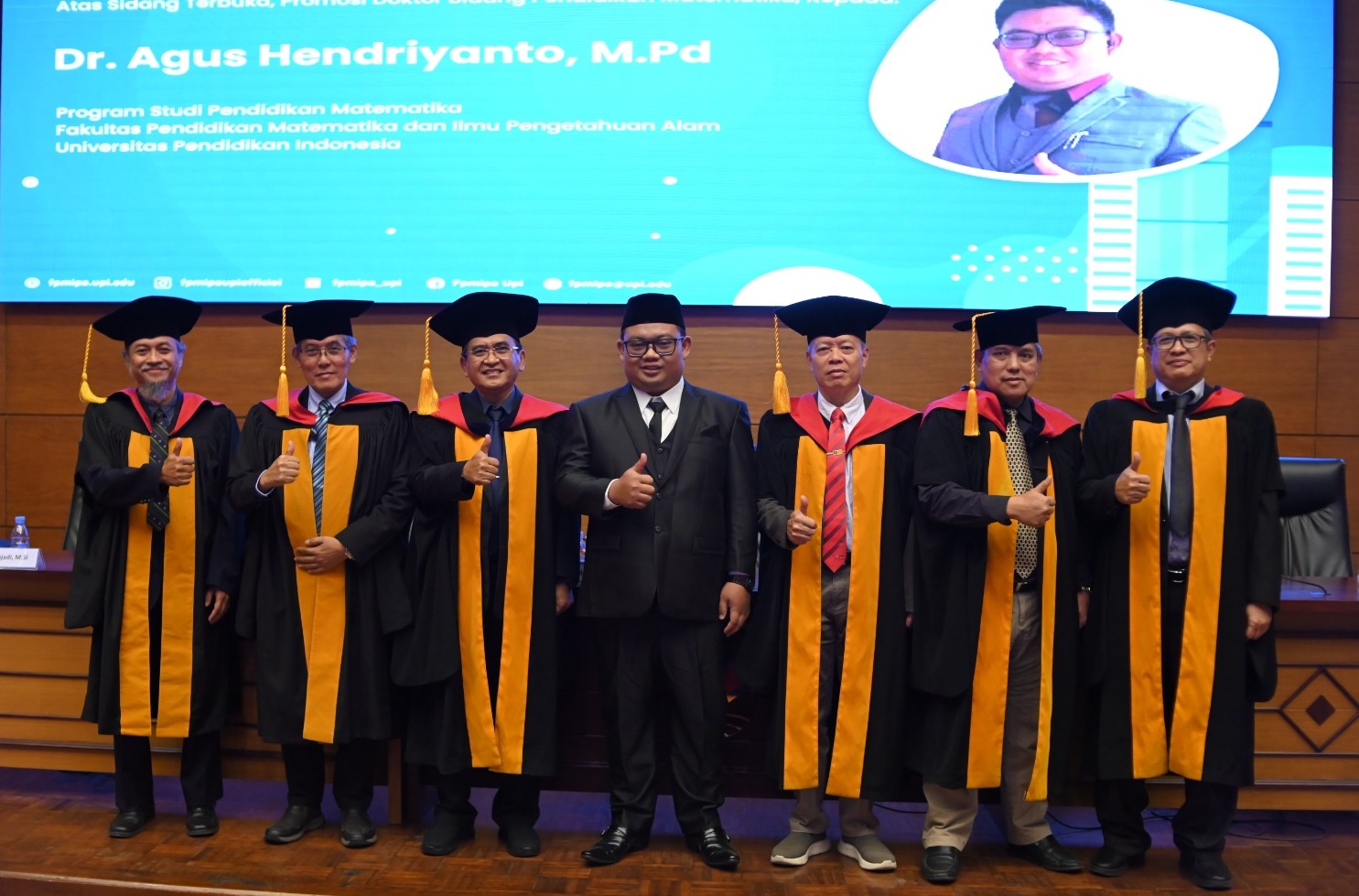Outstanding Achievement: A Doctoral Student of Mathematics Education FPMIPA UPI Completed Study in 2 Years 3 Months with 21 Scopus Publications and 9 Sinta 2 Publications

A new history was made in the academic world as a doctoral student of Mathematics Education at Universitas Pendidikan Indonesia, Agus Hendriyanto, managed to complete his studies in an astonishing time of just 2 years and 3 months. This achievement not only shocked national academic community, but also stole the attention of the international scientific community.
Amidst the hustle and bustle of academic and research activities, Agus has chalked up 21 scientific articles published in Scopus-indexed international journals. This number reflects not only outstanding productivity but also the quality of in-depth and relevant research. These publications cover a wide range of innovative topics in mathematics education, providing radical,2 practical and theoretical solutions.
Some international reputable journals from leading publishers have become a place for Agus’ works such as Eurasia Journal of Mathematics, Science and Technology Education (EJMSTE) – Modestum, Cogent Education – Taylor & Francis, Journal on Mathematics Education (JME) – Sriwijaya University, Humanities and Social Sciences Communications – Springer Nature, Heliyon – Elsevier, Frontiers in Education, and many other journals. In addition to international achievements, Agus also managed to publish 9 articles in national Sinta 2 indexed journals. With this contribution, Agus has enriched the literature of mathematics education in Indonesia, making a real impact on the development of education in the country.
Starting his studies on February 1, 2022, Agus immediately showed extraordinary enthusiasm and dedication. With the mentorship of leading professors and the support of sophisticated research facilities, he was able to complete a monumental dissertation entitled “Didactical Design of Set Materials: A Didactical Design Research Study in Assisting Internal Didactical Transposition for Prospective Professional Educators” in a relatively short time. This work offers new insights and innovative approaches in mathematics learning, which have been recognized by experts in the field.
In the Doctoral Promotion Session held on July 17, 2024 Agus explained that this research adopted an interpretative and critical paradigm within the framework of Didactical Design Research (DDR). The researcher is the key instrument in carrying out this research which involves participants from various groups such as teachers, Prospective Professional Educators (CPP), students, and lecturers/mathematicians. Through interpretive studies, various problems were found in the phenomenon of didactical transposition, including the incompatibility of the presentation of material in textbooks with scientific concepts, the tendency of teachers to credulous attitudes, various learning obstacles experienced by students, the permanence of discrepancies in understanding among CPPs, the ignorance of teachers and CPPs of didactical aspects, and the dominance of beliefs dominated by hoaxes.
Based on the findings, the critical paradigm was adopted to develop a Hypothetical Learning Trajectory (HLT) for CPP and implement it. The training for CPPs covered concepts such as the set of versions of scholarly knowledge, praxeology, epistemological knowledge, theory of didactical situation, learning obstacles, HLT components, and principles of DDR implementation. The results showed that the CPPs were able to develop didactical designs independently with significant changes in knowledge accuracy. However, there were still inappropriate old understandings that existed in the resulting designs, especially with regard to the presentation of sets. Finally, revisions were made to the hypothetical didactical design resulting in an empirical didactical design that can be used to provide training to CPPs in the process of developing didactical designs.
The doctoral promotion session was held by the Dean of FPMIPA UPI, Prof. Tatang Herman, M.Ed. On this occasion, the Dean as well as the Session Leader gave his highest appreciation. “Agus’ achievements are clear evidence of dedication and relentless hard work. We are very proud and inspired by this outstanding achievement,” said the Dean proudly. The examiners consisted of three promoters, Prof. Dr. Didi Suryadi, M.Ed., Prof. Dr. Dadang Juandi, M.Si., and Dr. Jarnawi Afgani Dahlan, M.Kes., one internal examiner, Prof. Dr. Rizky Rosjanuardi, M.Si., and one external examiner from Universitas Sebelas Maret, Dr. Imam Sujadi, M.Si.

The session discussed criticism of the regulations governing the four teacher competencies: pedagogical competence, personality competence, professional competence, and social competence. According to Promovendus, none of the four competencies are explicitly related to didactic aspects, even though didactic is an important element in the education system. Promovendus proposed that the law be amended to include didactical competencies. This proposal is supported by Prof. Didi Suryadi, M.Ed., promoter and originator of the concept of Didactical Design Research (DDR). According to Prof. Didi, when referring to the meaning of didactics as art, science, and epistemology, didactics also includes pedagogical aspects.
The criticism and proposed changes to teacher competence are based on didactic theory which considers the teaching process as art, science and epistemology. Didactics as an art implies that the design developed is oriented towards the process of diffusion and acquisition of knowledge that has a pleasant constructive impact, especially for students, so that they avoid ontogenic learning obstacles. Didactics as science means that the process of knowledge diffusion designed must be ensured to be systemic, namely clear sequences, stages, coherence, and praxiological organization. So that students avoid didactic learning obstacles. Didactics as epistemology means that the design developed must ensure the process of knowledge diffusion and acquisition, respectively as knowledge. In other words, the diffusion of knowledge must be epistemic, and its acquisition must also be epistemic, so that learners avoid epistemological learning barriers. By including didactical competence in the regulation, it is expected that teachers will not only master the pedagogical, personality, professional and social aspects, but also have the ability to design and implement effective and efficient teaching strategies based on didactical principles. This will improve the overall quality of education, as teachers will be more capable of adapting their teaching methods to the needs and characteristics of students.
Agus’ success is not only a source of personal pride but also an inspiration for thousands of students and young researchers around the world. With his achievements, he proves that with hard work, dedication, and a strong passion, nothing is impossible. He also has strong relationships with several international partners, one of which is the University of Aizu Japan. In addition, Agus was also active in doing community service both nationally and internationally during his studies.
In his speech, Agus expressed his deep gratitude. “First of all, let us express praise and gratitude to the presence of Allah SWT, because by His grace and favor, we can gather here in this very special event. I am very grateful to be able to stand before all of you today, in the context of my doctoral promotion hearing. Today is a meaningful and emotional day for me. The journey to reach this point was not easy and full of challenges. I would like to express my deepest gratitude to the various people who have provided support, guidance, and encouragement throughout my academic journey,” he said with emotion.
In the future, Agus hopes to continue contributing to the world of education and research. He plans to continue his academic career by developing more innovations in mathematics education, as well as mentoring the younger generation to reach new heights of achievement. This is his dedication to the support of the Indonesian people through study funding obtained from the LPDP. With this monumental achievement, Agus has etched his name in history and provided incomparable inspiration for all of us. Hopefully, this success can be the beginning of many other success stories in the future.


